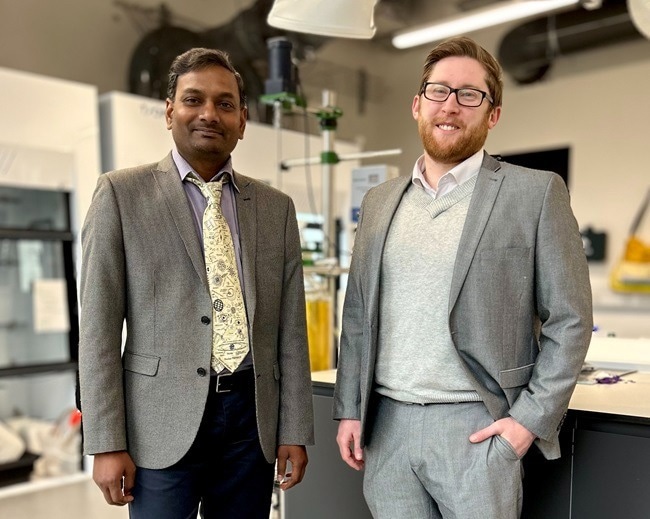Academics from Teesside University are advancing research in next-generation offshore wind turbine technology through a ground-breaking collaboration.
 Professor Kumar Patchigolla, Professor of Decarbonisation of Industrial Clusters at Teesside University’s Net Zero Industry Innovation Centre and Jason Moody, Chief Operating Officer of Time To ACT plc. Image Credit: Teesside University
Professor Kumar Patchigolla, Professor of Decarbonisation of Industrial Clusters at Teesside University’s Net Zero Industry Innovation Centre and Jason Moody, Chief Operating Officer of Time To ACT plc. Image Credit: Teesside University
Teesside University has secured Advanced Knowledge Transfer (AKT) funding from Innovate UK to work with Time To ACT plc’s subsidiary green energy company Greenspur Wind Limited, to develop permanent magnet generators (PMG) that do not rely on rare earth materials.
Rare earth magnets play a crucial role in clean energy technologies like electric vehicles and offshore wind turbines.
However, the increasing demand for these magnets, particularly in offshore wind, poses significant challenges due to supply shortages and environmental concerns.
The majority of rare earth magnet production is concentrated in China, which creates sustainability issues and supply chain risks.
In response, Stockton-based Greenspur Wind has created a new type of generator for wind turbines that does not rely on rare earth materials.
Instead, it uses special magnets, unique coils, and lightweight materials. This helps reduce the risk of supply problems, while offering cost-efficient benefits to the renewable energy sector.
Working closely with Teesside University, Greenspur Wind aims to develop a 3D computer simulation, known as a parameterised thermal model, for their PMG design.
This digital twin will analyse different aspects of the generators, such as magnets, structure, and heat, in order to improve and refine the design for various power needs and reach more markets.
Professor Kumar Patchigolla, Professor of Decarbonisation of Industrial Clusters at Teesside University’s Net Zero Industry Innovation Centre (NZIIC) said: As governments worldwide seek to decarbonise with renewables, advancing off-shore wind turbine technology becomes all the more important. The increased adoption of off-shore wind supports the country's commitment to reducing greenhouse gas emissions and decreasing reliance on fossil fuels.”
“We are excited to have Greenspur Wind involved in net zero activities at the Net Zero Industry Innovation Centre. Our mutual commitment to advancing off-shore wind with environmentally-friendly materials make us an ideal partnership for driving research and innovation in the Tees Valley region, and beyond.”
Jason Moody, Chief Operating Officer of Time To ACT plc said: "Time To ACT’s facilitation of this partnership underscores our commitment to fostering innovation in the renewable energy sector. Together with Teesside University, we are poised to make significant advancements in offshore wind technology."